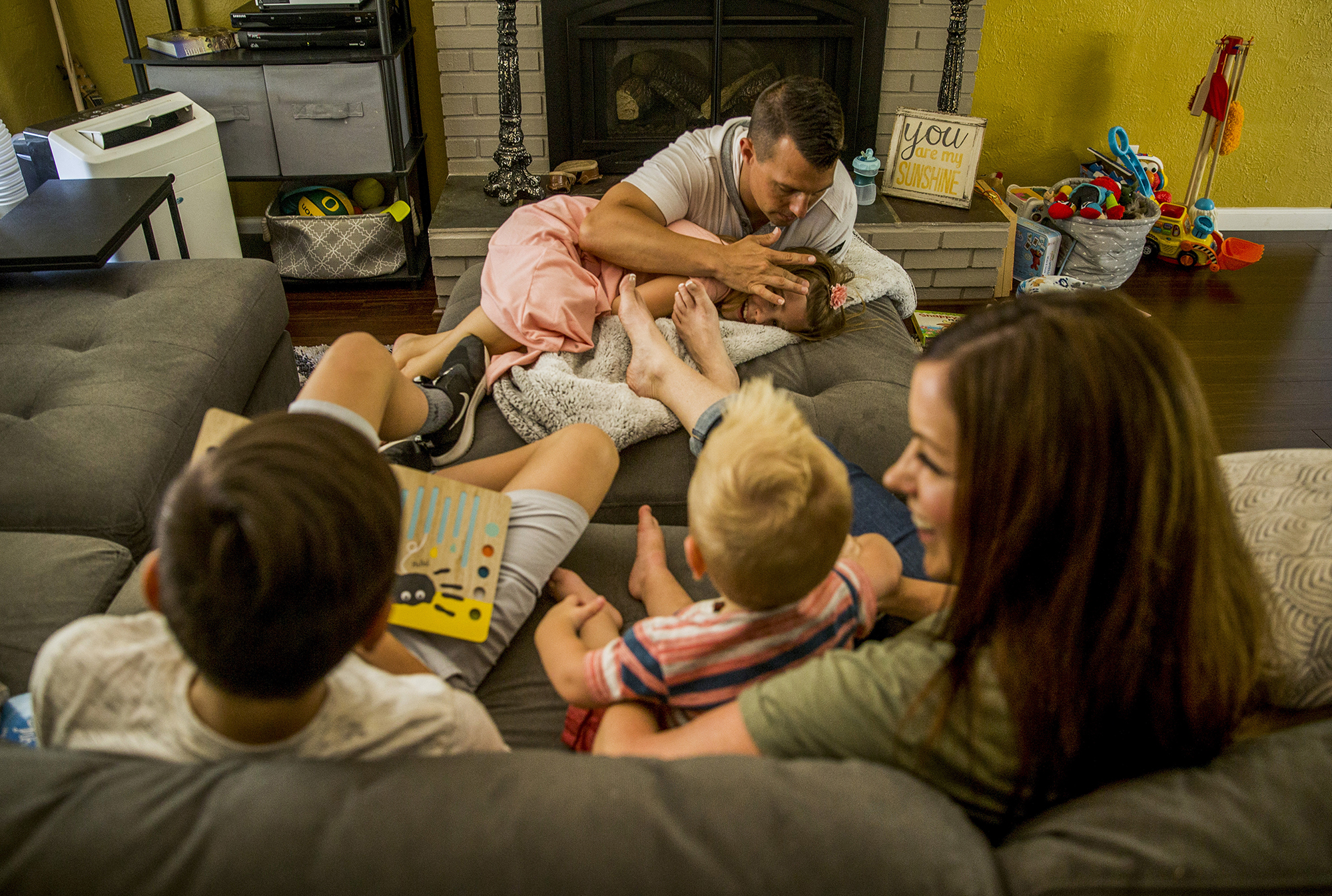Building hope
Diana Janz is the Founder and Director Hope Ranch Ministries and Lane County Against Trafficking . [Dana Sparks/The Register-Guard]
and helps them relearn living their life
Sex trafficking survivors often face their uphill battle to a better life alone. That’s what makes president and founder of Hope Ranch Ministries, Diana Janz, so passionate about helping them.
During a dark time in her life, Janz said she started working at a nonprofit in Los Angeles that supported human trafficking survivors. At the time, Janz said she didn’t know they helped victims of sex trafficking and was placed in a shelter working hands-on with victims.
“I had seen a documentary, but I still thought it was somebody else's problem and somebody else's kids in some other country,” Janz said. “But being there, working with them, I had no other choice but to dedicate my life to helping survivors.”
Sex trafficking is defined by the U.S. State Department as when an individual engages in a commercial sex act as the result of force, threats of force, fraud, coercion or any combination of such means. With a lack of public awareness and limited resources, sex trafficking often hides in plain sight and it's difficult to help trafficking survivors rebuild their lives.
In 2011, Janz started Hope Ranch in Eugene. It's a nonprofit, faith-based fellowship committed to providing safety, healing and hope for survivors of human trafficking.
Janz said it’s important for survivors to have people in their corner who understand they need time and help to heal.
One of the issues Janz feels personally is the lack of safe and secure housing for survivors after they're liberated. For the past several years, Janz has been housing survivors at her home when able. Providing survivors with support is key when they’re trying to rebuild their life, she said.
“For a lot of them, because of their trafficking situations, they've never finished school,” Janz said. “So their education, that's been interrupted. Their emotional life has been interrupted. In every way their life has been interrupted."
It's extremely difficult for victims to leave “the life” and, more importantly, manage to start over if they're freed from the situation, Lane County Senior Prosecutor Katherine Green said. Many survivors are faced with a lack of basic needs and skills that make starting a life hard, and are at risk of falling back into “the life again.”
“It's hard to try to start your own life after you've been in a trafficking situation, trying to find a job after you haven't had to work a real job,” Green said. “All of these different things that you have to try and figure out are much different than this experience. So I think a lot of times, it's easy to slip back onto that slippery slope.”
Aside from personally housing some survivors, Janz “does life” with them. She takes them to the store or doctor’s appointments. Every day living that people normally take for granted is extremely hard for someone who lived in a trafficking situation.
“They just need to know someone is there for them,” Janz said. “Don’t judge, and don’t try to fix them. That’s not your job. Just be there for them.”
Three years ago, Lindey Cooper, a Eugene sex trafficking survivor, wound up meeting Janz through a friend. According to Cooper, she told her story to Janz, who urged her to share her story to give others hope. Cooper started actively sharing her story two years ago. Janz made that possible, she said.
“I don’t think I would be where I am in my healing process without Diana,” Cooper said. “She really validated my experience and helped me share my story.”
When it comes to rebuilding a life, Cooper said hers took several years to do so. She’d given up dance, which was important to her, but then decided it was the only way for her to heal. She said she experienced significant pain during those years of rehabilitation. She suffered an abusive relationship, a sexual assault and a drunken driving accident where she was at the wheel and walked away unharmed, Cooper said.
Having a support system is what Cooper said allowed her to overcome her pain. At the time, Cooper said she didn’t understand what had happened to her, but that she was hurting.
“I was not OK underneath, but I was still showing up to dance,” Cooper said. “I was just trying to cover it up. Regardless of my 'why,' I was still showing up.”
Amanda Swanson, the trafficking coordinator for the Oregon Department of Justice, said sex trafficking involves trauma, leading to trauma bonding with the trafficker. It’s also common for traffickers to instill high levels of fear. During a grooming process, they can gain access to their victims' lives and use violence or threats against their families that keeps a victim from going to law enforcement.
According to the International Journal of Emergency Mental Health and Human Resilience, trauma bonding can happen when victims of abuse form powerful and emotional attachments to their abusers as a result of a complex interaction of abusive control dynamics.
“The attachment is marked by a shift in internal reality, whereby the victim begins to lose (their) sense of self, adopts the worldview of the abuser, and takes responsibility for the abuse.” Swanson said
Swanson, who has worked hands-on with numerous survivors, said many of them struggle to break their trauma bonds, suffering from Stockholm Syndrome as well as high levels of PTSD.
“I often get questions like, ‘Why don't they leave,’” Swanson said. “‘Why don't they leave, they’re not in physical chains.’ But chains of the mind and heart are so much stronger than physical chains.”

Collaborative effort to raise awareness
Janz also runs Lane County Against Trafficking, a small task force made up of people who participate in event education such as panels and community outreach, such as carrying signs and handing out brochures at University of Oregon football games.
“Everything we can do to get the word out is important and necessary,” Janz said.
In Lane County, there's a collaborative effort between various local agencies that serves as a response team for sex trafficking and provides survivors and victims with the best possible resources. The Lane County Commercial Sexual Exploitation of Children Multidisciplinary Team, or CSEC team, creates programs and resources for survivors to help combat and prevent sex trafficking in the area.
While it’s clear that Lane County has a path moving forward and more resources than most, numerous members of the CSEC team and Lane County and federal officials identified issues with funding, available resources and lack of public awareness when it comes to helping survivors and combating sex trafficking.
Swanson said, based on her information and the CSEC team, Lane County is doing a great job in bringing together a response to combat trafficking, but the county as well as the state still has a long way to go. She said it starts with education.
That education can involve discussing how to use survivor-centered, trauma-informed practices, basically the best practices when it comes to working with a trauma-impacted population.
“One of the things that we do when we do awareness training is talk about where the vulnerable populations are in your community,” Swanson explained. “Are you off Interstate-5 or Interstate-84, do you have a prison, the internet or a homeless population? All of these things lead to vulnerabilities for people that are going to be eventually trafficked, and Lane County has a lot of those.”
CSEC team's lead coordinator, Tamara LeRoy, who also serves as the trafficking intervention coordinator for Sexual Assault Support Services, highlights one major area the county needs to improve. “This county has such a fractured support system. We have insufficient funding to provide the necessary resources for the victims and survivors that need them.”
Another real barrier for many victims is fear, according to Denna Rawie, victim witness specialist for the U.S. Attorney’s Office. Fear of their trafficker, for their family and fear of the potential danger they’d be putting themselves in if they interacted with resources.
Law enforcement and the Lane County District Attorney’s Office hope to make survivors aware that they are taking a victim-centered approach when it comes to sex trafficking cases. Eugene police Detective Curtis Newell said victims identified through these programs and otherwise aren’t being arrested, cited or sent to jail.
“Every sex trafficking case is unique and has unique circumstances,” Newell said. “We look at all of them on an individual level and figure out the best way to serve them and provide them with the necessary resources.”

Giving support
For Janz, survivors are people who’ve had their lives as they know it taken from them. In order to take them back, they need patience, support and encouragement.
She advises people not to judge or preach at survivors and most importantly not to look at them like victims. Survivors long in their heart to be normal and live normal lives, Janz said. The little things that don't matter to some make a world of difference to a survivor.
"I knew that once I began to hear their stories that there was no way I could turn a blind eye to them," Janz said. "I think we can all do our little part, because our little parts add up to be huge."
Cooper said she was lucky enough to have a support system that stood by her through all her struggles. Eventually, Cooper met her future husband, Dusty, and she said he opened up her world.
“It was the first time that I realized I was worth something more,” Cooper said, gushing. “He loved me, but more importantly it was the first time a man had respected me.”
The pair opened Identity Dance Company and have three young children. Cooper said healing was the hardest part of her journey. It’s a process she’s still going through.
“I want people to know that I still have bad days, but I am still here,” Cooper said, emotionally. “For anyone else who has gone through this, it may take a long time and be painful along the way, but one day the pain will be replaced with hope and true unspeakable joy. It just takes time.”
This project was developed by Destiny Alvarez and Dana Sparks, Charles Snowden Excellence in Journalism reporting and multimedia interns for The Register-Guard. Follow Destiny on Twitter @DesJAlvarez or email destinyjalvarez@gmail.com. Follow Dana on Twitter @danamsparks or email dsparks@registerguard.com.